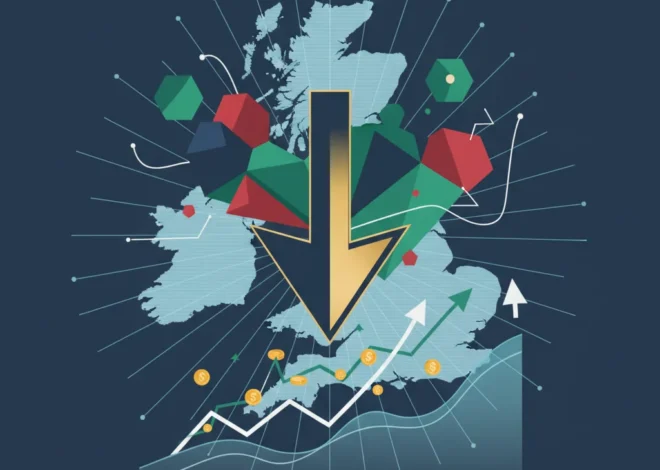
HSBC’s New UK Chief: Why David Lindberg’s Appointment Signals a Seismic Shift in British Banking
A New Captain for a British Banking Titan
In the world of high-stakes finance, leadership changes at globally systemic banks are more than just a personnel update; they are bellwethers of strategic shifts, signaling new priorities and future direction. The recent announcement that HSBC has appointed David Lindberg, a seasoned executive from rival NatWest, to lead its UK ringfenced bank is precisely one of those moments. This move, as reported by the Financial Times, is a significant development for one of the UK’s largest financial institutions, and its ripples will be felt across the entire British banking landscape.
But why does this specific appointment matter so much? To understand its gravity, we must look beyond the headline and delve into the man, the role, and the turbulent economic environment he is stepping into. This isn’t just about filling a vacancy; it’s a strategic maneuver aimed at fortifying HSBC’s domestic dominance against a backdrop of fierce fintech competition, economic uncertainty, and evolving consumer expectations.
Understanding the Ringfenced Kingdom
Before analyzing the new chief, it’s crucial to understand the kingdom he will rule. HSBC UK is not just a branch of the global HSBC Group; it is a “ringfenced bank.” This is a specific legal structure mandated for large UK banks in the aftermath of the 2008 financial crisis. The goal of ringfencing, as outlined by the Bank of England, is to separate a bank’s essential retail banking services (serving individuals and small businesses) from its riskier investment banking and international operations. In essence, it creates a protective wall around the day-to-day banking services that millions of people rely on, shielding them from potential shocks in the global stock market or complex trading activities.
HSBC UK is a behemoth in its own right. It serves around 14.75 million customers and is a cornerstone of the nation’s economy. Lindberg is therefore not just taking on a senior management role; he is becoming the custodian of a systemically important financial institution, responsible for the savings, loans, and mortgages of a significant portion of the UK population. The stability and growth of this entity have direct implications for the wider British economics.
Navigating Choppy Waters: How New US Port Fees on Chinese Ships Will Reshape Global Trade
Who is David Lindberg? The Digital-First Retail Specialist
David Lindberg is far from an unknown quantity in the UK’s financial circles. His most recent role was as the head of the retail banking division at NatWest Group, one of HSBC’s primary competitors. During his tenure, he was a driving force behind the bank’s digital transformation and customer-centric initiatives. His leadership was marked by a focus on simplifying processes, enhancing mobile banking capabilities, and responding to the rising tide of financial technology challengers like Monzo and Starling.
His track record speaks volumes about his priorities. Before NatWest, Lindberg spent seven years at Australia’s Commonwealth Bank (CBA), another institution renowned for its digital innovation. This background makes him a specialist in the very areas where traditional banks face their greatest threats and opportunities: customer experience and digital agility. By poaching a leader with such a distinct profile, HSBC is sending a clear signal: the future of its UK business lies in winning the battle for the digital-first consumer.
A Tale of Two Titans: Lindberg’s New Challenge
To grasp the scale of Lindberg’s new role, it’s helpful to compare his previous position at NatWest with his new one at HSBC UK. While both are major players, the scope and global context of HSBC present a different set of challenges and opportunities.
Below is a comparison of the retail banking operations Lindberg will be leaving and the ringfenced bank he is set to lead.
| Metric | NatWest Group (Retail Banking) | HSBC UK (Ringfenced Bank) |
|---|---|---|
| Primary Focus | UK-centric retail and commercial banking. | UK-centric retail and commercial banking, part of a global group. |
| Customer Base | Approximately 19 million customers across its brands. | Approximately 14.75 million customers. |
| Key Responsibilities | Led the digital transformation of personal banking, mortgages, and wealth management. | Oversee all aspects of the ringfenced entity, including retail, commercial, and wealth, while managing regulatory complexity. |
| Strategic Challenge | Competing with UK peers and fintechs; managing the legacy of state ownership. | Leveraging global brand strength locally; accelerating digital adoption in a large, established institution. |
| Reported Assets (Group) | ~£724 billion (NatWest Group, as of end 2023) (source) | ~$3 trillion (HSBC Group, as of end 2023) (source) |
The Strategic Imperative: Why Now?
HSBC’s decision is a direct response to the powerful forces reshaping the finance industry. The modern banking battlefield is no longer just about the number of branches or the size of a balance sheet. It’s about user interface, data analytics, and the speed of innovation. Here are the key strategic drivers behind bringing Lindberg on board:
- The Fintech Onslaught: Digital-only banks have captured the loyalty of millions, especially younger demographics, by offering superior user experiences. HSBC needs a leader who understands this threat intimately and can mount an effective defense and counter-attack.
- Navigating Economic Headwinds: The UK economy faces a challenging period of fluctuating inflation, high interest rates, and a cost-of-living crisis. A leader with deep experience in retail lending and customer financial health will be essential to navigate these turbulent waters.
- The Monetization of Data: Large banks like HSBC hold vast amounts of customer data. The challenge is to use this data ethically and effectively to offer personalized services, improve risk management, and create new revenue streams—a core tenet of modern financial technology.
- The Future of Banking Technology: While still in early stages for retail banking, technologies like AI and blockchain are on the horizon. A forward-thinking leader is needed to prepare the bank for the next wave of technological disruption, ensuring it remains a leader, not a laggard.
A Toast to Economic Growth: Unpacking the Investment Potential of UK Pub Licensing Reforms
Implications for Investors and the Broader Market
For those involved in investing, this leadership change is a critical piece of information. It suggests that HSBC’s board is prioritizing the stability and modernization of its UK operations, a key and consistent profit center for the group. A successful digital transformation under Lindberg could unlock significant value, improve efficiency, and strengthen the bank’s competitive moat.
The move also puts pressure on competitors. NatWest has lost a key architect of its retail strategy, while other major players like Lloyds and Barclays will be watching closely to see how HSBC’s renewed focus on digital and customer experience plays out. A more aggressive and innovative HSBC UK could intensify competition, potentially leading to better products and services for consumers but tighter margins for the banks.
From a macroeconomic perspective, the health of a major bank like HSBC UK is vital. A strong, stable, and forward-looking leadership team helps ensure the continued flow of credit to individuals and businesses, which is the lifeblood of the economy. Lindberg’s success or failure will have a tangible impact beyond the bank’s own balance sheet.
Conclusion: A Bet on the Future of British Banking
HSBC’s appointment of David Lindberg is far more than a routine executive shuffle. It is a calculated and strategic bet on a future where banking is defined by digital excellence, customer obsession, and the ability to adapt at speed. Lindberg brings a proven track record in the exact areas where HSBC needs to excel to defend its market leadership.
He faces a formidable task: steering a massive, systemically important institution through a period of profound economic and technological change. He must balance the need for innovation with the imperative of stability, and foster a culture of agility within an organization built on centuries of tradition. For investors, competitors, and millions of customers across the UK, the Lindberg era at HSBC will be one to watch with keen interest. The future of a British banking giant—and a significant part of the UK financial landscape—depends on his success.


